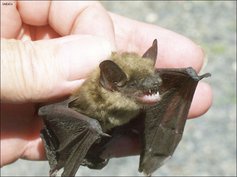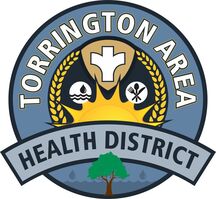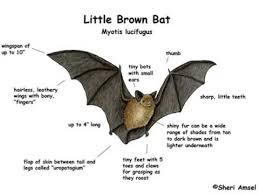Click HERE for an excellent brochure on Rabies
Click HERE for information on Animal Rehabilitation
Rabies
Don't handle wild animals!
Vaccinate your pets!
Bats & Rabies
 Little Brown Bat
Little Brown Bat
Rabies is deadly disease which infects mammals only. Human cases of rabies in the U.S. are rare, but always fatal. The last human case in CT was a twelve year old girl in Greenwich in 1995. Raccoons, skunks, bats and cats are the most common carriers of the rabies virus in Connecticut. It is spread through a bite or by getting infected saliva in an open wound or in an eye, nose, or the mouth. There is no treatment for rabies after symptoms appear, it must be prevented with a series of shots starting immediately after exposure.
Prevention
- Vaccinate your pet against rabies - it is the law, and they are the barrier between wild rabid animals and your family.
- Don’t let your pets run wild - this will greatly reduce their chances of having contact with a rabid animal.
- Do not pet or feed wild or stray animals (especially warn your children) - some rabid animals do not appear sick.
- Bring open food containers inside at dusk - you do not want to attract night feeding animals to your home.
- Secure your garbage containers - sources of food attract nuisance animals.
- Report any strange acting animals to the Local Police or the Animal Control Officer - bring pets and children indoors.
- Bat proof and raccoon proof your home - best done by professionals.
Pet Exposure
- Without risking personal injury, try to capture the wild animal involved in an incident for later rabies testing.
- If you see your pet fight with a wild animal or if your pet comes home with injuries and you believe it may have been bitten or scratched by a wild animal, isolate your pet immediately.
- Be sure to use gloves when touching or handling your animal. Immediately contact your veterinarian and/or the Torrington Area Health District.
Human Exposure
- Without risking personal injury, try to capture the wild animal involved in an incident for later rabies testing.
- Try not to panic - Wash the affected skin thoroughly with soap and hot water.
- Immediately contact your doctor and the Torrington Area Health District.
- All incidents involving bats indoors should be evaluated with the Torrington Area Health District - catch the BAT!
- Rabies vaccine is available at local emergency rooms for immediate treatment.
Animal Testing For Rabies
- Large domestic animals must be prepared and submitted by veterinarians.
- Smaller wild animals (e.g. bats, raccoons, skunks) can be brought to the Torrington Area Health District where they will be sent to the State Laboratory.
- Contact the Torrington Area Health District @ (860) 489-0436 for instructions.
Pre-exposure Rabies Vaccination Recommended For High Risk People
- Veterinarians and their staff
- Municipal Animal Control Officers
- Private Nuisance Wildlife Control Operators
- Animal Rehabilitators
Links
- CDC Rabies Information
- State of Connecticut Manual for Rabies Management and Protocols
- Capturing a Bat: What You Need and How to Do It



